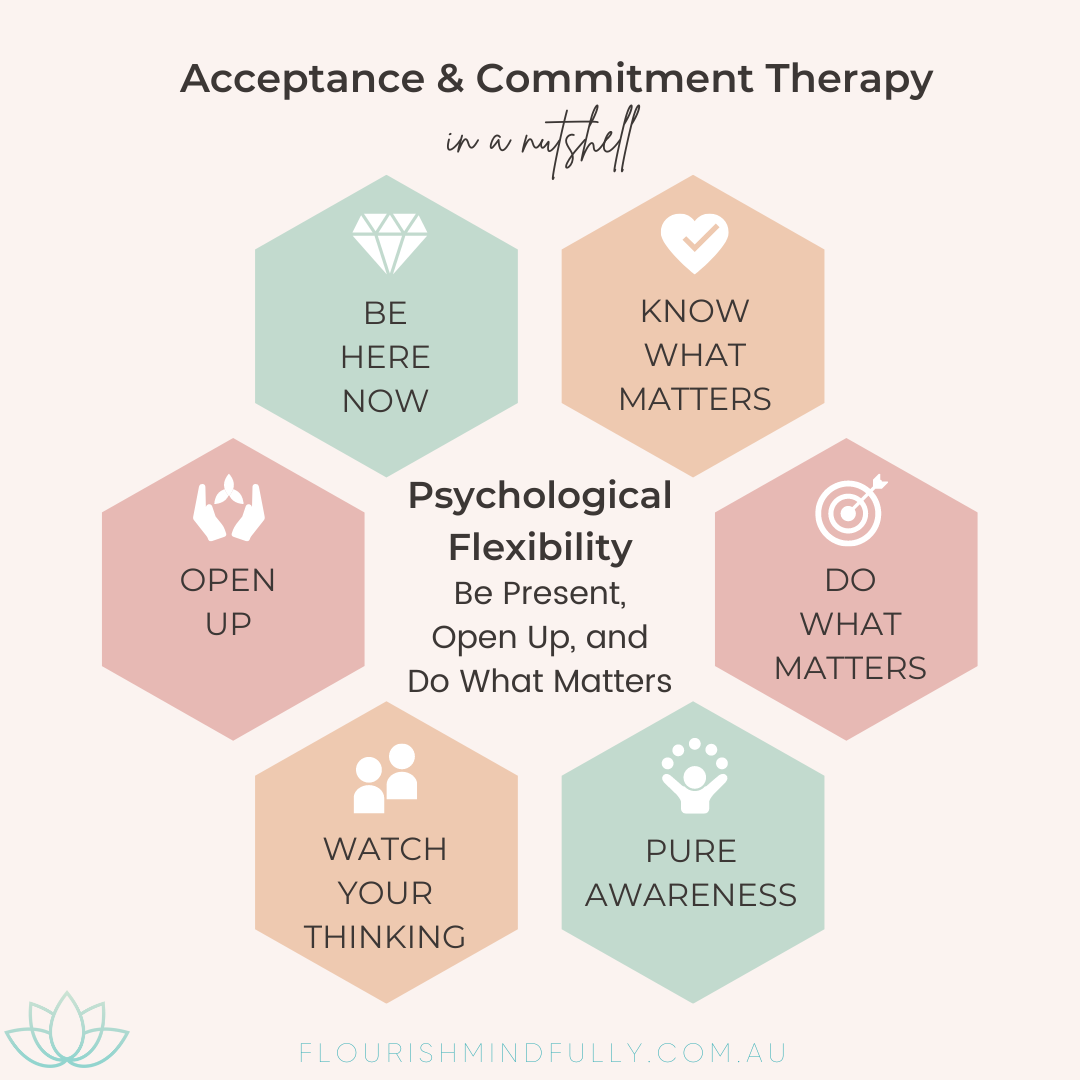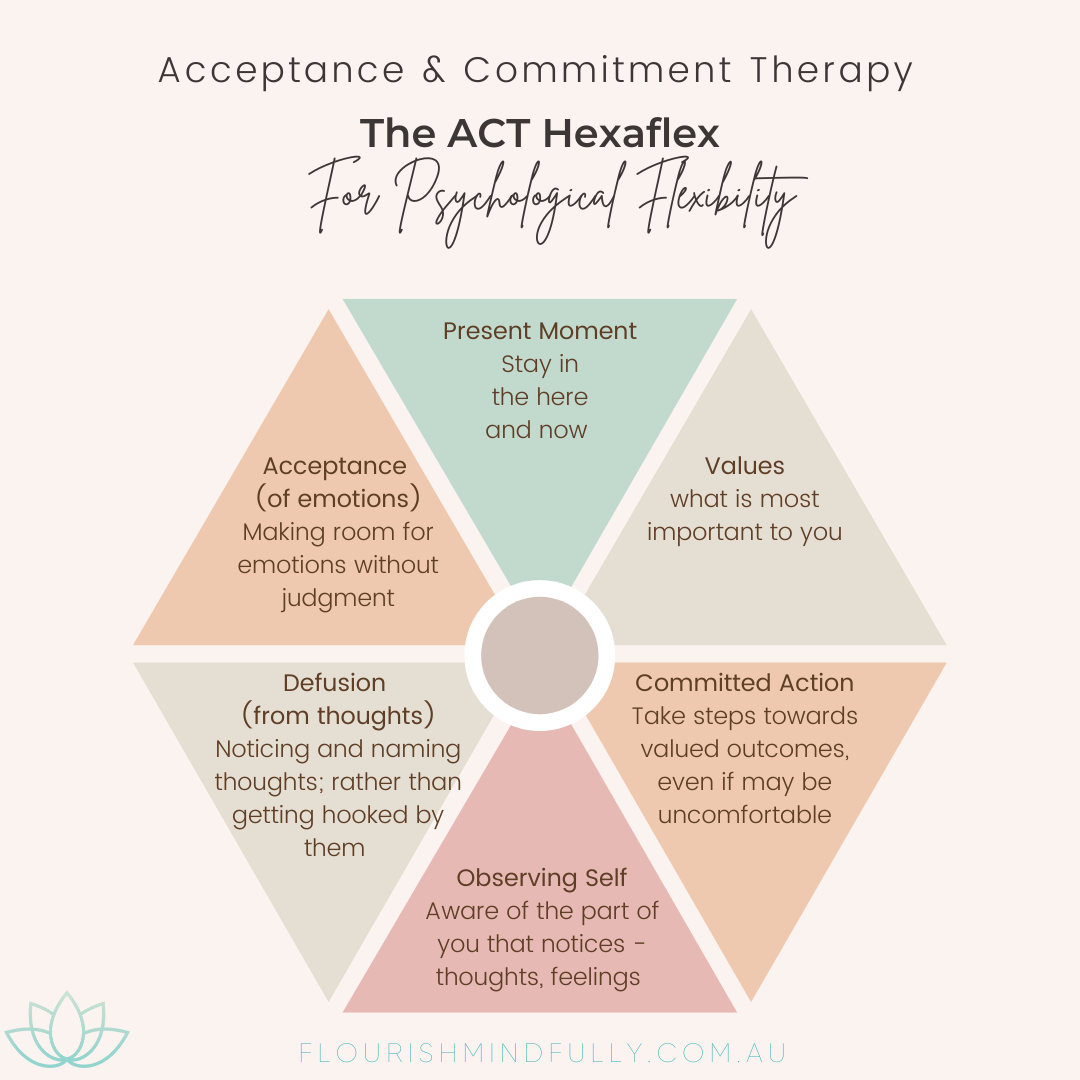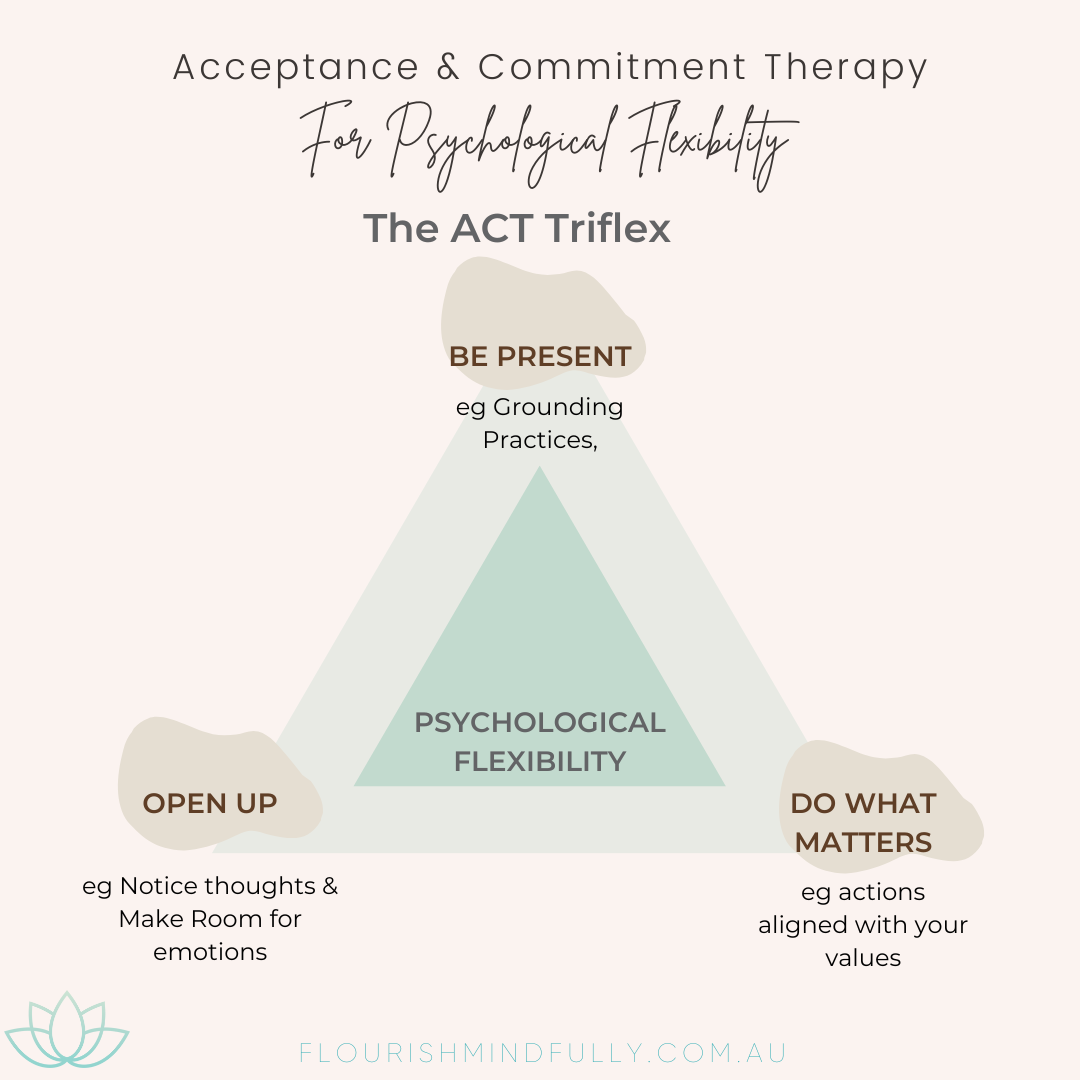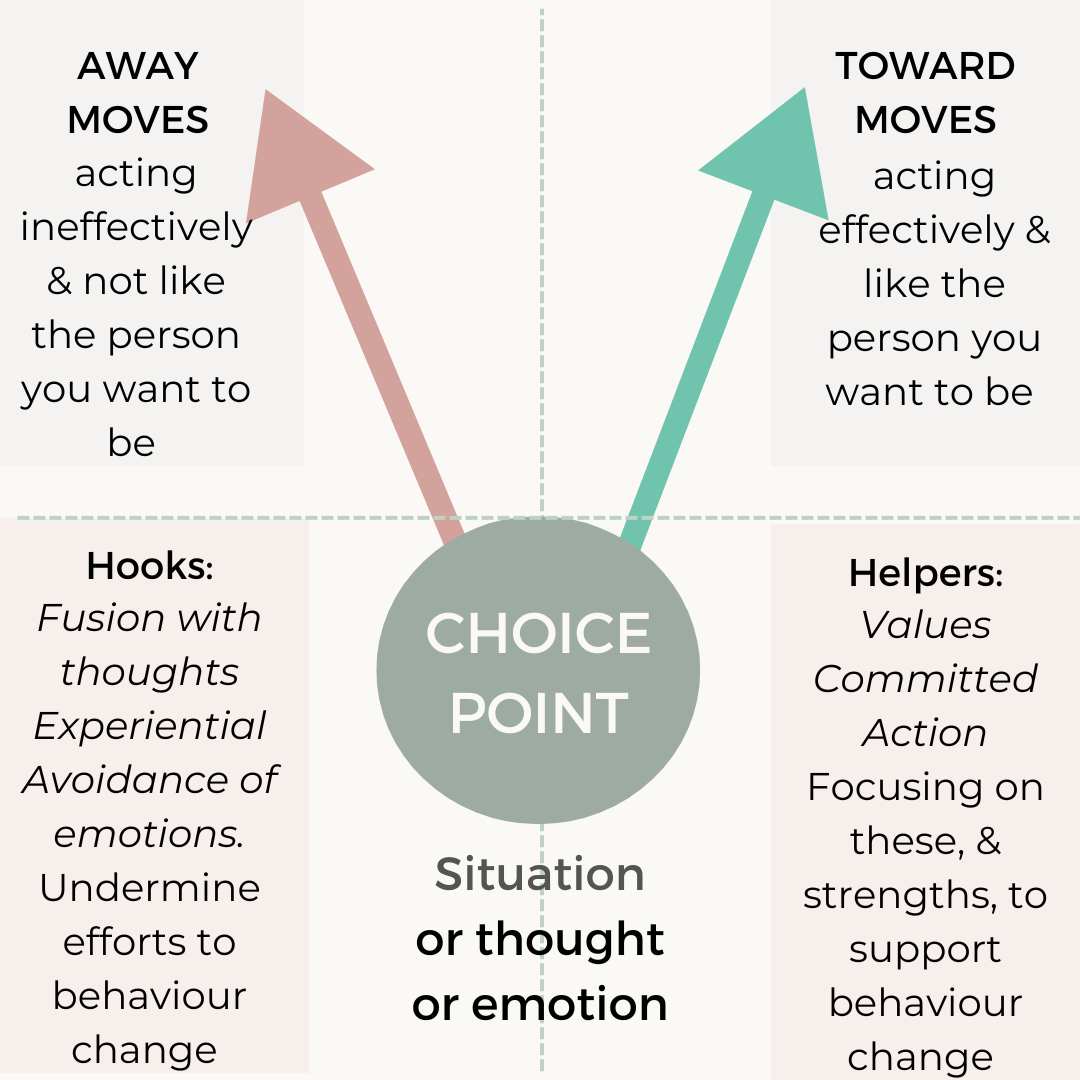Acceptance and Commitment Therapy (ACT) in a nutshell
Why I love using ACT as a therapeutic model
Acceptance and Commitment Therapy (or ACT) is one of the new behaviour therapies that has evolved from Cognitive Behaviour Therapy (CBT).
ACT includes mindfulness philosophy as an important component to both psychological support and behaviour change.
In a session using ACT, you will be encouraged to notice and name thoughts and make room for all emotions, instead of challenging and restructuring your thinking and emotions (which is a regular practice in CBT).
While the CBT approach most certainly has its place, I find the newer, 3rd wave behaviour therapies of ACT and DBT (Dialectical Behaviour Therapy), to be more aligned with my personal and professional experience of healing and managing psychological issues. The benefits of ACT have also been shown through a number of research studies.
As a mindfulness practitioner, ACT aligns with the attitudes I bring to meditation – curiosity, interest, non-judgement, being with what is and welcoming all of it… while having capacity to choose where I place my attention.
The name of this therapy sums it up nicely; Acceptance (of thoughts and feelings, without judgment), and Commitment to act in a way aligned with your values.
The capacity to do this is built from cultivating an underlying appreciation and practice of present moment awareness.
“You can’t stop the waves, but you can learn how to surf”
ACT is a helpful framework for both counselling and coaching
The ACT model has 6 elements (or core processes, as they are officially referred to).
The pictures below provide 1) an image of the 6 elements which form 2) ‘The ACT Hexaflex’, and 3) a helpful summary of the 6 elements, condensed into 3 aspects, in ‘The ACT Triflex’:
The ACT Triflex (represented in the triangle Image above):
Be Present represents 2 elements – Contact with the present moment (‘Present Moment’; being in the here and now), and also ‘Self as Context’ which can be a little tricky to conceptualise however you might think of this as ‘the noticing, or ‘Observing’ self’.
Open Up represents the elements of Acceptance of your emotions as they arise, and Defusion from the thoughts that you get caught up in. Defusing from your thoughts is akin to stopping over-identifying with them, or stopping merging with them, so there can then be some room for other options. Acceptance is akin to making room for the emotions that are here and knowing there is more than just them.
Do what matters is about being clear on your Values and Committing to Action that aligns with these values.
Acceptance, Defusion and Self as Context are mindfulness practices while Contact with the present moment, Values, and Committed Action are the behaviour change aspects of the model.
I really like the Choice Point, developed by Russ Harris (see Russ’s YouTube video), and shown in below imagery. The Choice Point is a simple, and practical way to conceptualise ACT. I’ve depicted an image of the choice point below, with some indicators to support its application.
We start at the bottom of the choice point. There is a Situation, a Thought, or a Feeling.
When this situation, thought, or feeling occurs, we make a choice.
This choice could be categorised as something we do (overt), or think (covert), that moves us in the direction of the person we want to be/the life we want to live (a towards move), or something we think or do that moves us away from the way we want to be (an away move).
It’s important to remember we all make away moves. Away moves are only a problem when the individual experiencing them deems it to be a problem. From that point they may then decide they want to change, or not. It’s not someone else’s decision. It is a personal viewpoint. It’s also important to note that nobody makes towards moves all the time. We are human, and away moves are part of being human, and not necessarily a bad thing.
Using the Choice Point
If you decide there is a behaviour or thought pattern that is an away move and is problematic (not helping you), you can have a go at working through the choice point on your own, or reach out for professional support from a counsellor or psychologist, and work through this process with them.
If you’re working on your own, you can download a choice point template here[1] .
Using the template, write down your away moves, along with the situation of thought of feeling that is associated with the away move (choice point), and then consider what some toward moves would be, to replace the away moves.
You may find this list of examples of Away Moves that Russ Harris has shared on Psychwire helpful.
When working out what your toward moves are, it is very helpful (and I would recommend), to get clear on your values. When you know your values, these will inform what your towards moves are, and help you build your repertoire of towards moves as options in this situation (choice point).
Here is a values checklist exercise and you can read more on my blog on Values here.
Next, we want to understand why we keep doing the away moves. We tend to do away moves when we are ‘hooked’ by, or ‘fused’ with a thought, or not accepting our experience in relation to the emotions and feelings we are experiencing. There are many ways we can work with these thoughts and feelings, to unhook and have more capacity to make towards moves.
“Thoughts are not truth or facts, they are just what our brain is offering up
in any moment.”
When you can unhook from your thoughts and feelings, they have less control over your behaviour and this allows you to function more fully in your day to day life.
If ACT sounds like it could be a helpful modality for you, please feel free to book in a session to start (or continue) your personal healing and growth journey. As a counsellor and psychotherapist I can work with you in making the changes you would like, or deepening your awareness of Self, and support you in your healing.
Additionally, there is many free ACT resources online, from Russ Harris, the Australian ACT Therapist, Trainer, Author of ‘ACT Made Simple’. I highly recommend visiting ACT Mindfully for more information and resources.
Psychwire has consolidated some of Russ’s key ACT resources here.
Nicky is a qualified and Registered Clinical Counsellor, and Psychotherapist, Mindfulness Meditation Teacher and Yoga Teacher. With lived experience of stress, anxiety and overwhelm in her previous corporate career, Nicky is equipped personally and professionally to support you with tools and techniques to manage these life challenges.





